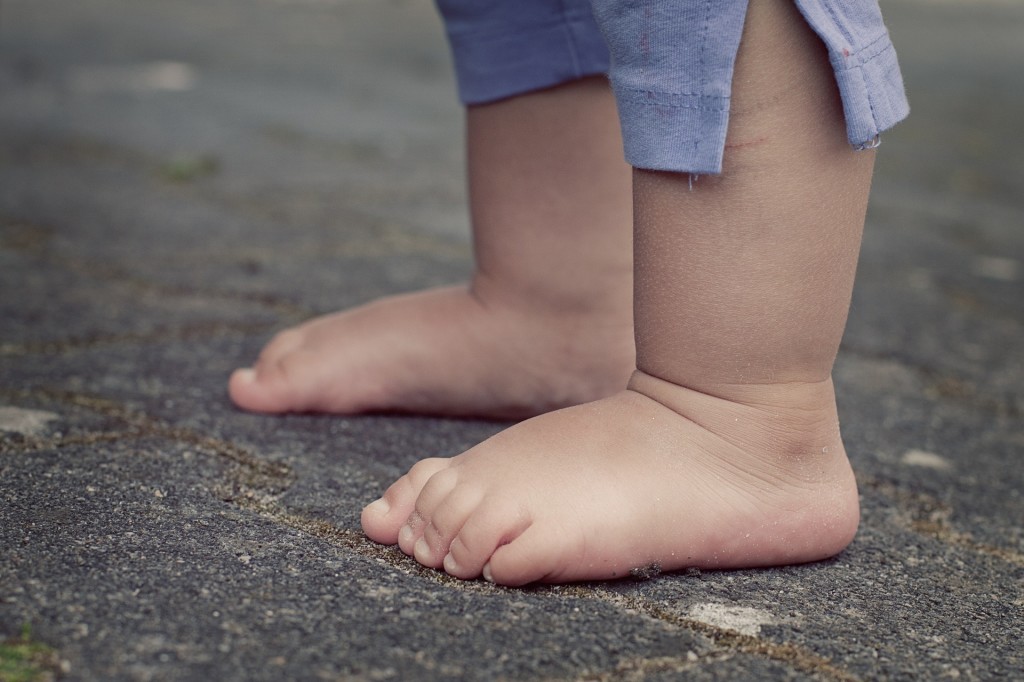
It had been a long night, and I was so close to being on the other side of it. Then halfway through the last verse of the last bedtime song, you lifted your head up. “Wawa?” you asked.
I took a cursory glance around the room, knowing I wasn’t going to see a sippy cup. “There’s no water up here. You’re fine.”
“Wawa?”
“Honey, no.”
“Wawa!”
More insistent this time. And my anger flashed to the surface, fast and red and hot and fiery. A quick intake of breath. My body stiffened, my teeth clenched. And of course you felt it. Despite my quickly stifling it, you felt it as clearly as I did, and you melted into me.
Your tiny body shook with sobs because the person you love most in the world, the person who you depend on for everything you need, turned momentarily monstrous because you wanted water. Because you were thirsty before going to bed and you have no autonomy with which to resolve your problems.
Imagine living life with that kind of lack of control. We talk a lot about how hard it is to be a mom, and with good reason — this gig is anything but easy. But the second week of April is “The Week of the Young Child,” and in its honor I’d like to acknowledge how hard it is to be a small child.
As a therapist, I often try to imagine what life is like for young children. If I want to find a solution to difficult behavior, I first have to try to understand it. And each time I put myself in the shoes of a young child I come to the same conclusion: Not a single one of us adults could cope with the things they have to cope with.
For starters, think about being told what to do, when to do it, and how to do it — endlessly. Eat this thing that you’ve never seen before. Don’t make a rude face (what does rude mean?). It’s time to go somewhere you don’t want to go, and hurry, hurry, hurry to meet an arbitrary timeline that means nothing to you.
Imagine failing as much as a young child does. Not being able to make your hands move the right way to cut the paper, stumbling as you run across the lawn, spilling the milk you so desperately wanted to pour (and here I am, exasperated with him again).
Another bedtime example:
“Dad, tell me how the guy got up there.”
“He climbed.”
“NO, tell me how he got up there?”
Over and over again, our son becomes more and more frustrated until I realize he meant to say, “ASK me how he got up there?”
One wrong word changing the whole sentence and causing all that frustration. Imagine constantly failing to effectively communicate with the people in your life. Day after day, struggling to find the right word, saying one thing when you mean another, mispronouncing words so much that nobody knows what you’re saying. And then having people get frustrated with YOU, lose patience with YOU.
One of my favorite books to read with the kids is “Everywhere Babies.” The last page reads, “Everyday everywhere babies are loved. For trying so hard, for traveling so far, for being so wonderful, just as they are.” I tear up almost every time I read it because it’s so true. In spite of it all, they try and they try and they try again. They greet their days with smiles, enthusiasm, and excitement. They forgive our mistakes, our flashes of fiery, unfair anger. They meet our impatience with patience (at least sometimes), they laugh and live and love with reckless abandon.
So when they push us to the edge of our limits, let’s try to remember that we’re doing the same thing to them.
Happy “Week of the Young Child”!













I love this article. I try hard not to get frustrated with my little one because I know most things are new to him. He doesn’t understand what is going on and he cannot control anything in his environment yet. “Your tiny body shook with sobs because the person you love most in the world, the person who you depend on for everything you need, turned momentarily monstrous because you wanted water. ” This one line sums up so much for me personally. Even when we try to hide our anger or frustration, the little person in our life can recognize the shifts and it affects them so drastically. Thank you for sharing this post!
Quote… “the person who you depend on for everything you need, turned momentarily monstrous because you wanted water.”
First, it’s more than likely that they are not actually thirsty, this is a psychological thing. Second, why would this make you angry? I never just say “No”, I usually give an explanation or make it into a story. Like “When I was little, I used to drink a glass of water right when I got in bed, but then I wet the bed and it was cold sleeping on wet sheets”. They need to understand why, not just be told “No”. I feel like this article is completely missing the point. People need to actually hone their parenting skills, not just talk about them.
Your way requires no introspection into yourself as the parent. This is about honing the parent, not the skills. It’s about developing empathy for your child.
Maybe your kid isn’t thirsty, but I bet he needs water.
I tend to agree Bob. Also, wanting water is a classic sign of testing the boundaries… first it will be water, then water and toilet, then water, toilet and PBJ sandwich… you get the idea! When I say goodnight to my children, it means bed. No if’s, but’s or maybe’s. Our responsibilities as parents is to teach our children the way the world works – not to pander to their every demand.
I always get a drink or two right before going to sleep. I cannot sleep without it. I will toss and turn for an hour for more and end up chewing the inside of my cheek or tongue overnight if I don’t drink right before trying to sleep. This was true for me as a kid too. And there are times when I am hungry at bedtime even if I ate a good dinner. I can’t sleep well when I’m hungry either. I do generally wake to pee during the night or very early in the morning but that is okay. Provide a diaper for your child or wake them for a potty trip in the night. Don’t deny them a drink or a small snack (offer carrot sticks or another veggie, if they are not really hungry you’ll know that by them turning down a healthy option). I can understand trying to keep them in their bed and no toys or tv at bedtime but as a kid that spent countless hours going crazy from hunger and thirst because it was bedtime and I was denied food and drink I will never do that to my kids. A quick drink of water or a tiny quick snack brought to them in bed and a possible overnight potty trip are not big deals.
Isn’t Katie’s point though about understanding how they’re feeling when they push the boundary? About being more empathetic about their thoughts and feelings in that moment when we’re frustrated and tired and jad enough? That maybe they are just pushing but maybe they’re lonely, sad, trying to work up to asking something big. Not just to be all i’m the parent and you’re the child so you’ll do whatever i want you to do AND expect you to be happy?
If I said all of that to my two year old, it would accomplish nothing because he doesn’t yet understand consequences that will happen hours from now. And the question probably didn’t make the mom so much angry as it made her frustrated that after working that hard to get the child to bed, she knows she’s about to be back at square one.
How rude! Danny tanner would never have written a comment like this.
I want to thank you for writing this. This absolutely made me think deeper. I often get frustrated with my son, but I believe it’s also a learning experience with parents. I currently just finished my college child psychology course and this (what you wrote) is so deep and so in tune to how a child feels, it’s what our course was based off of. I’ve always loved the quote “My child is not GIVING me a hard time, my child is GIVING a hard time” what you wrote goes so much deeper! Absolutely loved it and I shared it in all my mommy groups!
I think you meant “My child is not GIVING me a hard, my child is HAVING a hard time.” In case anyone is confused. 🙂 This is my mantra lately…
This is SUCH a good reminder. I easily become frustrated with my preschooler, but she maintains so much poise through so much difficulty. I often look to her as an example of how I should try to act, and this is more proof. Thank you!
Thank you! This really brings it into perspective. It’s easy to forget where they are coming from sometimes
Applies to pets as well! They too forgive us on a daily basis.
Nice article…. Very true
This just gave me one more thing to have mom guilt for, thanks.
Don’t feel guilty, decide to change! You are totally capable of changing the way you view your child’s behavior. So tomorrow, when your child is pushing your buttons, try to remember to look at it from their side, and maybe it will change the reaction you have. Don’t worry about what’s already happened. You can’t change it even if you wanted to. Instead try to do better in the future! Being a mama is hard! You’re doing a great job! ❤
I think the title tell’s all, it hard for them to, they can’t express what they need and we need to take a step back and try to think through their eyes, their just babies trying to learn.
Oh My God. Yes, it is so, so hard to be a young child. Everything is so new and so much of what they do, they’re doing for the first time. I mean, adults don’t cope too well with change, so imagine what it must be like for these kids (who have no training in change management, remember) to cope. No access to therapy, and they can’t even have an affair to take thwir mind off it. The whole thing must be so traumatic it causes them to bury their memories of that epic struggle. I know I have no recollection at all of all the hurrt, the heartache. All I remember is the joy of new experiences and my amazement with a world that was fresh and new.
Next week, “Traumatized in the womb by mom’s choice of music.”